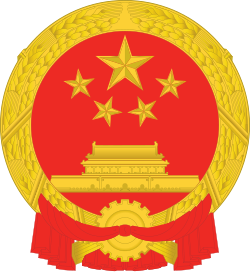| 国家邮政局 Guójiā Yóuzhèng Jú | |
 | |
 Headquarters | |
| Agency overview | |
|---|---|
| Formed | March 1998 |
| Preceding agency | |
| Jurisdiction | People's Republic of China |
| Headquarters | Beijing |
| Agency executives |
|
| Parent agency | State Council via the Ministry of Transport |
| Website | www |
| State Post Bureau | |||||||||
|---|---|---|---|---|---|---|---|---|---|
| Simplified Chinese | 国 家 邮 政 局 | ||||||||
| Traditional Chinese | 國 家 郵 政 局 | ||||||||
| |||||||||
The State Post Bureau is the government agency that regulates China Post,the postal service of China. [1] [2] [3] The agency was created in 1998 as a successor to the Ministry of Post and Telecommunications. The agency used to report to the Ministry of Industry and Information Technology and is now under the administration of the Ministry of Transport. [4] The bureau is headed by the Director-General. The current Director-General is Ma Junsheng. [5]
